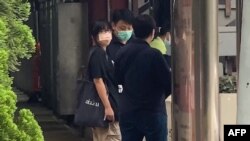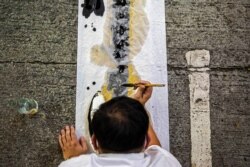Hong Kong police arrested on Friday an organizer of annual vigils for the victims of China's 1989 Tiananmen crackdown on pro-democracy protesters, in what activists see as a suppression of one of the city's most powerful symbols of democratic hope.
The arrest of Chow Hang Tung, vice-chairwoman of the Hong Kong Alliance in Support of Patriotic Democratic Movements of China, comes as thousands of police are expected to patrol the city's streets to prevent people from gathering.
The heightened vigilance from authorities was a marked departure from Hong Kong's cherished freedoms of speech and assembly, bringing the global financial hub closer in line with mainland China's strict controls on society, activists say.
The annual June 4 vigil in Hong Kong's Victoria Park, the world's largest, is widely seen as a symbol of the former British colony's democratic aspirations and desire to preserve its different way of life from mainland China.
Chow was arrested for promoting an unauthorized assembly, Chiu Yan Loy, Executive Member of the Alliance, told Reuters in a text message.
"She only wanted to go to Victoria Park, light a candle and commemorate," Chiu said, adding he believed the arrest was meant to strike fear into those planning to attend the vigil.
Senior superintendent Terry Law confirmed police arrested a 36-year-old member of the Alliance and a 20-year-old food delivery man for promoting an unauthorized assembly. It did not name the arrestees as per its usual practice.
Chow, 36, told Reuters this week before her arrest that June 4 was a test for Hong Kong "of whether we can defend our bottom line of morality."
"As long as they haven't said candles are illegal, we will light a candle," she said.
The Alliance's chairman Lee Cheuk-yan is in jail over an illegal assembly.
Police have banned the vigil for a second year in a row, citing the coronavirus. It did not say whether commemorating Tiananmen would breach a sweeping national security law China imposed in 2020 to bring its most restive city onto an authoritarian path.
City leader Carrie Lam has not commented on commemorations, saying only that citizens must respect the law, as well as the Communist Party (CCP), which this year celebrates its 100th anniversary. June 4 commemorations are banned in mainland China.
Last year, thousands in Hong Kong defied the ban, gathering in the park and lining up on sidewalks with lit candles across the city, in what was largely a solemn event, bar a brief scuffle with police in one district.
"It is a battle against oblivion," exiled activist Sunny Cheung told Reuters by text, adding the vigil "defines" Hong ong as "the only beacon of liberty and truth under the CCP's governance."
'Light a cigarette’
Many plan to light candles again in their neighborhood, if safe to do so. Some churches will be open for prayers.
Jailed activist Jimmy Sham said via his Facebook page he planned to "light a cigarette at 8 p.m."
"We do not see the hope of democracy and freedom in a leader, a group, or a ceremony. Every one of us is the hope of democracy and freedom."
Activists Figo Chan and Leung Kwok-hung, known as Long Hair, both also in prison, plan to fast on Friday, Chan's Facebook page said.
Prominent activist Joshua Wong was given a 10-month prison sentence last month after pleading guilty to participating in last year's vigil, while three others got four-to-six-month sentences. Twenty more are due in court on June 11 on similar charges.
On Wednesday, Hong Kong's June 4th Museum said it would temporarily close due to a license probe.
Neighboring Macau has also banned June 4 activities. In democratically ruled Taiwan, a memorial pavilion will be set up in Taipei's Liberty Square, where people can lay down flowers while following social distancing.
Taiwan President Tsai Ying-wen said the island's people will never forget what happened 32 years ago.
"I believe for all Taiwanese who are proud of their freedom and democracy, they will never forget about this day and will firmly stick with their faith, unshaken by challenges," she said in a statement on her Facebook page.
China has never provided a full account of the 1989 violence. The death toll given by officials days later was about 300, most of them soldiers, but rights groups and witnesses say thousands of people may have perished.






